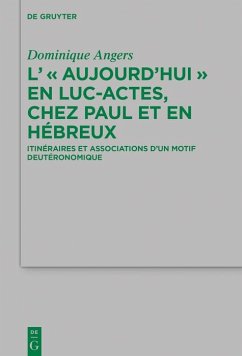This book examines the use of the term s¿µe¿¿¿ ("today") in Luke-Acts (22 occurrences), the Pauline letters (Romans 11:8; 2 Corinthians 3:14, 15) and the Epistle to the Hebrews (1:5; 3:7, 13, 15; 4:7 [twice]); 5:5; 13:8). It gives special attention to the possible influence of the Deuteronomic "today" in the New Testament. Two main hypotheses are at the heart of this study. First, the word "today," in Deuteronomy as well as the three New Testament corpora under consideration, becomes a theological theme of its own. Second, in the minds of the three New Testament authors who give attention to this motif, there seems to be an awareness of certain theological associations that are bound up with the Deuteronomic "today." By the end of this investigation, it becomes apparent that Luke's today, Paul's today and the today of the Epistle to the Hebrews, while each possessing unique characteristics, all contribute to emphasize the same key theological concepts, such as the fulfillment of Scripture, an inaugurated and progressively realized eschatology, the coming of salvation, the heralding of the good news and the proclaiming of God's Word.
Dieser Download kann aus rechtlichen Gründen nur mit Rechnungsadresse in A, B, BG, CY, CZ, D, DK, EW, E, FIN, F, GR, HR, H, IRL, I, LT, L, LR, M, NL, PL, P, R, S, SLO, SK ausgeliefert werden.



